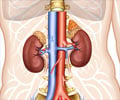A new vaccine that contains a weakened version of anaerobic bacteria, Clostridium novyi, which can thrive in oxygen-poor conditions has been found to shrink tumors.

"We have encouraging signs that this bacteria could be used to treat certain inoperable tumors, and that could give hope to some patients who don't have any other options," said Saurabh Saha, M.D., Ph.D., a longtime cancer researcher at BioMed Valley Discoveries and senior author of the study. "But we are still in the early stages, and need to further assess the safety and efficacy of the treatment, as well as explore how well it works in combination with other cancer therapies."
The study was published August 13, 2014, in Science Translational Medicine.
The idea of using bacteria to combat cancer dates back to the 1890's, when cancer researcher William Coley noticed that some patients who developed postsurgical infections went into remission or were even cured of their disease. Despite the approach's initial promise, progress was slow for the next century.
Over a decade ago Bert Vogelstein, M.D., a cancer researcher at the Johns Hopkins School of Medicine and one of the study co-authors, tested a number of microbes before identifying a particularly promising one called Clostridium novyi. Because C. novyi is exquisitely sensitive to oxygen, it would grow inside the oxygen-poor core of tumors but stop once it reached healthy tissue. In previous studies, Vogelstein and his colleagues tamed the bacteria further by removing its ability to make toxins and then injected it intravenously into laboratory animals. Though the bacterial treatment had dramatic effects in a third of the mice and rabbits, no complete responses were seen in dogs with naturally occurring cancers.
Dr. Saha and his colleagues at BioMed Valley Discoveries wondered if this failure was due more to the route of administration than to the therapy itself. One issue with intravenous delivery is the small proportion of spores that actually make it to the tumors. The researchers hypothesized that injecting the spores directly into tumors would not only overcome this problem, but might also trigger localized inflammatory and immune responses against tumor cells.
Advertisement
The next step was to attempt the treatment in humans. The first patient to enroll in this Phase I investigational study was a 53-year old woman with retroperitoneal leiomyosarcoma whose disease, despite eight rounds of chemotherapy and radiation, had spread to her liver, lungs, abdomen, upper arm, and shoulder. The researchers injected 10,000 spores into the patient's metastatic right shoulder tumor. Within days, CT scans and biopsies demonstrated that the bacteria had infiltrated the tumor and had begun destroying tumor cells. Weeks later, a follow-up MRI showed that a significant amount of tumor had been destroyed. As a result of treatment, the patient's shoulder pain subsided and she was able to move her arm again.
Advertisement
"Earlier pre-clinical studies showed that in the process of destroying cancer tissue, C. novyi-NT generates a potent innate immune response which also contributes to the localized tumor destruction," said Dr. Saha. "The hope is that C. novyi-NT will be a useful adjuvant to the new immune checkpoint inhibitors that can block the ability of tumors to evade a host mediated immune response. It will be interesting to see if a combination of the two approaches could destroy tumors not just at the injection site, but also at any other sites where the cancer may have spread to throughout the body."
Source-Eurekalert












